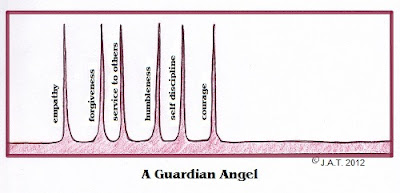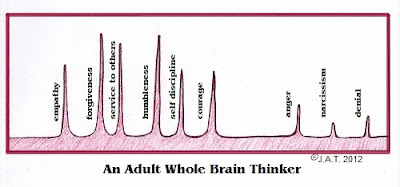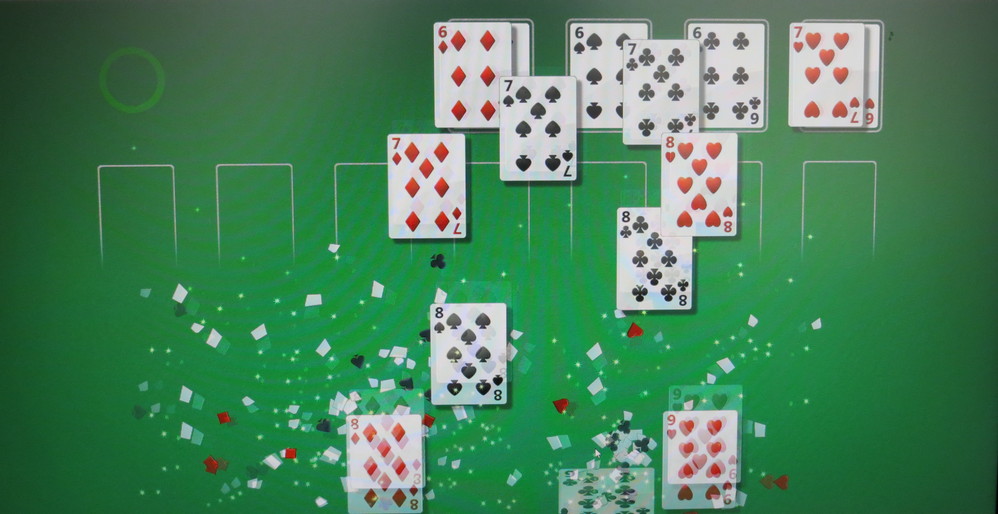A: Can you please explain as simply as possible WHY it matters that each person has a unique soul blueprint and WHY it’s important for each person on a spiritual journey to uncover the specific details of his or her own unique blueprint?
J: Let’s use an imaginary person as an example to make this simpler. I’m going to call this imaginary person Jane Tamaguchi.
A: Okay.
J: Like all human beings, Jane is a soul. She doesn’t have a soul. She is a soul. She’s an angel — a child of God. Like all angels, she was born as a soul long before she decided to incarnate as a human being. Soul energy isn’t visible in the third dimension — the dimension that human beings live in during their temporary lives as incarnated souls — but soul energy can be felt in the third dimension.
A: Can you give some examples of “feelable” soul energy? (I think I just invented a new word.)
J: Yes. When you feel a deep sense of connection with another person, that’s soul energy. When you feel empathy for other creatures, that’s soul energy. When you feel committed, romantic, monogamous love, that’s soul energy. When you give or receive forgiveness, that’s soul energy. When you’re willing to trust in a loving and compassionate God, that’s soul energy.

Thomas 67: “One who knows everything else but who does not know himself knows nothing.” (Translation by Stevan Davies, photo credit JAT 2015)
A: Those are all emotions. Positive emotions. Uplifting emotions.
J: Yes. All souls are intensely emotional in positive, uplifting, creative, intuitive, loving ways.
A: So much for Christian angelology, that says angels have no emotions of their own and are simply instruments of God’s work and God’s will.
J: Yes. That’s another Christian doctrine that should go the way of the 8-track recording system.
A: But angels also have minds, as you’ve said previously. They have minds plus emotional hearts.
J: Yes. Christians have long believed — based largely on theories of the soul put forward by Plato, Aristotle, Tertullian, Augustine, and others — that the soul itself consists of a single indivisible substance. Arguments raged as to the exact nature of this substance. But the basic idea was that the soul was made of just one thing because — as the theory went — the soul couldn’t really be a soul if it could be “divided” into two or more substances. It should go without saying that this is a ridiculous supposition. There are no analogies anywhere in nature or in the quantum world for a complex lifeform made of a single element such as pure hydrogen or pure gold. All lifeforms, whether they exist in the third dimension or in higher dimensions, are extremely complex. A soul is a quantum being whose “biology” is far more complex than that of any 3D creature — which is pretty much what you’d expect for children of God who were born in the fourth dimension, and who will spend most of their eternal existence in parts of the “implicate order” that can’t be seen or measured by human beings in the third dimension.
A: So people just have to take it on trust? On blind faith?
J: I wouldn’t say that. Individuals who want to take the time to do intensive research into quantum physics and quantum biology will soon discover that the universe being studied by today’s scientists is extremely complex. This isn’t the cosmology of Plato or Thomas Aquinas. It’s breathtakingly complicated and interconnected. There’s plenty of room in there for a modern doctrine of the soul that doesn’t in any way violate the laws of quantum biology.
A: Okay. So tell me about Jane. Who is she as a soul?
J: Jane is a female angel, and for the purposes of this discussion she’s heterosexual.
A: I know what this means for human beings. But what does this mean for angels?
J: It means exactly what it sounds like. All angels are one of two sexes: male or female. Just as with human beings. There are no “in-between” sexes or alien sexes. All angels are either male (the same sex as God the Father) or female (the same sex as God the Mother). This is pretty much what you’d expect by looking at life on Planet Earth.
A: Some creatures on Earth are able to reproduce without a sexual partner. Komodo Dragons, for instance.
J: There are different modes of reproduction for creatures that live on Planet Earth. Reproduction is part of the 3D biological package. It isn’t part of the 4D soul package. We’ll come back to that at a later time.
A: But sexual orientation is part of the 4D soul package. Why is sexual orientation necessary for angels?
J: Because each angel has a soulmate. One true eternal love partner. A divine spouse. The one partner in all of Creation who’s a perfect match in every way, including intimate, private ways. Each angel in God’s Creation is paired with his or her perfect eternal partner. For many angelic couples, the perfect partner is of the same sex. Ain’t nothin’ wrong with that.
A: So God the Father and God the Mother are not a same-sex couple themselves, but it’s okay with God if their children choose a same-sex partner to share eternity with.
J: Yes. God’s children are not carbon copies of their divine parents. God’s children come in every size and shape and colour imaginable. Yet every soul couple is blissfully happy, blissfully complete. This is what God the Mother and God the Father want for their children — bliss. Everybody’s different. Yet everybody’s happy. It’s the perfect divine family when you think about it.
A: So Jane has a specific sex — female — and a specific sexual orientation — heterosexual. What else does she have?
J: She has a soul body. Her soul body has a unique size and shape that’s perfect for her. Her soul body probably doesn’t look too much like her current human body, but that’s okay. She’s very happy with the soul body she has.
A: What else?
J: She has a soul mind. As a soul, she’s pure consciousness — by that I mean she has full awareness at all times of her own thoughts and her own feelings and her own choices and her own needs and wishes. Part of her unique mind lies in the way she thinks, the way she learns, the way she remembers, the way she expresses herself. These attributes lie within the soul mind. Jane doesn’t “know” everything. Nor does she want to. She has certain interests that are hard-wired at the very core of her consciousness, and these are the things she learns fastest and remembers best.
A: Can you give an example of what Jane might be interested in as a soul, as an angel?
J: Okay. Let’s say for argument’s sake that Jane is a gifted musician.
A: There are some angels who are more musically gifted than other angels?
J: All angels enjoy music to some extent. But not all angels want to spend most of the day in classes devoted to advanced musical performance and interpretation skills. As with all things in Creation, it’s a continuum. All angels appreciate music. But some angels want to devote most of their time to it. Which means they can’t be devoting their time to other interests, other skills. There’s only so much time in a day, even for an angel.
A: What other interests does our imaginary Jane possess as a soul?
J: Jane likes to be around a lot of other angels. She gets very lonely if she can’t hear other angels singing. She’s happiest when she’s with a big group of noisy, laughing angels.
A: Are there any angels who are more quiet in temperament, who wouldn’t feel comfortable in large groups?
J: Yes, lots. And that’s okay, too. These angels are quiet, but not in any way unfriendly or unloving. They just need more quiet than other angels do. Nothing wrong with that.
A: Let’s give Jane a third unique attribute. What would you suggest.
J: She doesn’t like the colour red.
A: Huh?
J: All angels appreciate the fact that everything in Creation is beautiful and deserving of respect. So Jane respects the colour red, and she’s happy for her friends who love all things red. But angels have their own taste, their own “likes” and “dislikes.” And Jane herself is under no divine obligation to like red. It happens that she doesn’t. God the Mother and God the Father respect the fact that Jane just doesn’t happen to like red. On the other hand, she can’t get enough black. She’s crazy for black.
A (grinning): I know a certain male angel who happens to love black! And a particular shade of charcoal grey.
J: Yeah, I do like those colours. Can’t deny it.
A: Okay. So we have our angel Jane, who’s passionate about music, loves to be around large groups of people, isn’t fond of the colour red, but likes black. Jane decided a while back to incarnate as a human being on Planet Earth (her choice), and right now she’s 35 years old, is working as a nurse, is taking night school courses so she can apply to law school, and lives with a female partner who has painted the bedroom red. Tell me about Jane’s current brain health.
J: All the things we talked about — Jane’s true soul interests — are hardwired into her human DNA. That’s the junk DNA that geneticists are puzzled by. Her soul’s blueprint is hardwired into her brain and central nervous system. Her brain stem, cerebellum, hypothalamus, thalamus, basal ganglia, and glial cells contain coding that’s unique to her, unique to her true soul personality. If Jane were to make conscious choices that “matched” or “lined up with” her core blueprint, her biological brain would function smoothly. It would function the way it’s supposed to. Her mood would remain stable. Her thinking would be logical and coherent. Her memory would be pretty good, especially around music and musical interpretation! She would have excellent social functioning. All in all, she’d be pretty happy, healthy, and well adjusted.
A: Okay. But right now Jane isn’t making conscious choices that “line up with” her own soul’s core identity. She’s working as a nurse, not as a musician. She’s around lots of people, which is good, but the people aren’t singing. She’s in a lesbian love relationship. And every night she has to go to sleep in a room that isn’t healing or calming for her as a soul. What’s happening inside her brain at this point?
J: There’s a software conflict. On the one hand, the so-called “primitive” parts of Jane’s brain are saying “I want to craft music, I want to find a loving male partner, I want to be around the colour black.” Meanwhile, Jane’s forcing the outer cortical layers of her brain to make different choices — choices that seem logical to her peers or to her family, perhaps, but which make no sense to her core self.
A: So how’s Jane doing?
J: Her brain is pretty messed up. There are competing signals from the different regions of her brain and central nervous system. The signals contradict each other. By now she’s feeling confused and upset with her life, and she doesn’t why. Things seem okay on the outside. But on the inside she’s not happy. She may be having trouble with headaches or poor sleep or depression or one of the many other signs of imbalance that can emerge via human biology.
A: A lot of these medical issues would begin to clear up if Jane were to seek professional counselling and appropriate medical care to help her uncover the choices she’s making that aren’t working for her.
J: Yes. Jane has been making choices based on other people’s priorities rather than her own core priorities — the priorities of her soul. Over the long term, her poor choices have begun to affect her health and her happiness.
A: Can she force herself to “be” a nurse and “be” a lawyer if her soul isn’t wired for healing or for case analysis?
J: No. This is what I meant when I said the soul isn’t malleable in the way that clay is malleable. Jane can only be who she is. If she tries to be somebody she’s not — if she tries to be a lesbian nurse-lawyer who wears red power suits — her biological brain will begin to sustain serious damage from the continuous push-and-pull of her internal “software conflict.” She’ll literally fry her own brain from the inside out.
A: Okay. That’s pretty clear. Be yourself — be the person God knows you to be — so your brain and body will function the way God intended.
J: Simple in fact. Simple in reality. But not always easy to implement.
A: At least it gives people a starting place on the journey. At least it helps them understand where they’re going and WHY. It helps so much to understand WHY.
J: Insight is one hell of an amazing miracle.
Posted in
angels (i.e. persons-of-soul),
brain's Soul Circuitry,
brain-soul connection,
Davies (Stevan),
gender and sexuality,
Gospel of Thomas,
insight,
interoception,
Jesus Redux,
Mother and Father God,
orthodox teachings about the soul,
Plato,
quantum theory,
Soul,
soul blueprint,
soul purpose,
Thomas 67 and tagged
brain-soul connection,
Gospel of Thomas |












































